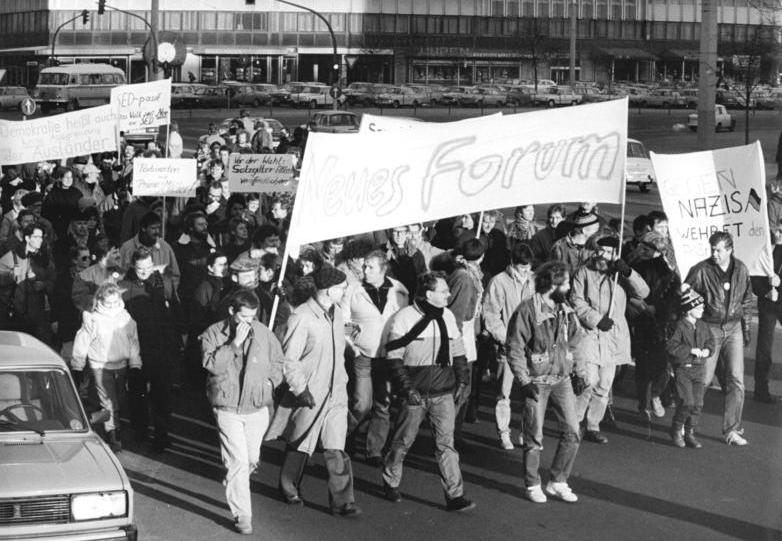10. September 1989 – Gründungsaufruf zum Neuen Forum
Neues Forum – Die Wende bekommt erste Strukturen
Der am 10. September 1989 veröffentlichte Gründungsaufruf “Die Zeit ist reif – Aufbruch 1989” ist ein weiterer Meilenstein zur Schaffung demokratischer Strukturen in der DDR. Eine illustre Truppe von Künstlern, Wissenschaftlern, Studenten, Kirchenleuten und Arbeitern, forderte darin alle DDR-Bürger zu einem demokratischen Dialog und der Teilhabe an der Umgestaltung der Gesellschaft auf. Neben der sicherlich beabsichtigten, sehr heterogenen, Zusammensetzung fällt auf, dass zunächst keinerlei konkrete politische Forderungen formuliert wurden. Im Nachhinein liegt der Schluss nahe, dass dadurch auch schon die kommende Zersplitterung vorbereitet wird. Wenn der kleinste gemeinsame Nenner die Erkenntnis ist “So kann es nicht weitergehen”, dann verliert eine solche Vereinigung schnell seine Daseinsberechtigung sobald diese Erkenntnis eine Mehrzahl der Menschen erreicht.
Grundsätzlich sah die DDR-Verfassung durchaus vor, dass Privatbürger Vereinigungen gründeten, so lange Grundsätze und Ziele der Verfassung geachtet würden. Dennoch ist es nur wenig verwunderlich, dass die am 19. 09. 1989 eingereichte offizielle Anmeldung des Neuen Forums (NF) abschlägig beschieden wurde. Bereits am 21.09. bezeichnete die staatliche Nachrichtenagentur ADN das Neue Forum als staats- und verfassungsfeindlich, bevor am 25. endgültig die Ablehnung erfolgte – mit der Begründung, es bestünde keine Notwendigkeit für eine derartige Vereinbarung.

ADN-ZB Oberst 10.12.89 Berlin: Das Neue Forum hatte zu einer Demonstration anläßlich des bevorstehenden Internationalen Tages für Menschenrechte aufgerufen. An der Spitze des Zuges lief der Mitbegründer des Neuen Forum Prof. Jens Reich (2.v.l.) (Bundesarchiv, Bild 183-1989-1210-006 / CC-BY-SA)
Zu diesem Zeitpunkt hatten allerdings schon knapp 3.000 Menschen den Aufruf unterzeichnet, der zumeist auf per Hand abgetippten Zetteln verbreitet wurde. Bis zum Jahresende stieg diese Zahl auf fast 200.000 Unterzeichnern bei 10.000 regulären Mitgliedern. Den immer lauter werdenden Rufen nach Veränderung und stetig wachsenden Montagsdemonstrationen bot das NF so etwas wie eine erste Struktur, einen Rahmen innerhalb dessen sich die Opposition entwickeln konnte. Erheblichen Einfluss hatte in diesem Zusammenhang die Unterstützung durch die protestantischen Kirchen, die maßgeblich zu der schnellen Verbreitung des Aufrufs beigetragen haben.
Gerade viele Westdeutsche haben mittlerweile vergessen, dass die Wiedervereinigung damals für kaum Jemanden eine Rolle spielte. Das Neue Forum wie auch andere Gruppen ging wie selbstverständlich von einer weiter bestehenden Zweistaatlichkeit aus. Ziel war auch nicht eine simple Kopie der sozialen Marktwirtschaft westdeutscher Prägung, sondern vielmehr die demokratische Umgestaltung der DDR. Ende Januar 1990 ergingen aus dem Umfeld des Forums mehrere Aufrufe zur Gründung einer Partei. Nach teils heftigen Streitigkeiten spaltete sich ein Teil der Mitglieder ab und gründete die Deutsche Forumpartei, die nach der Wiedervereinigung in der FDP aufging. Am 06. Februar – zu diesem Zeitpunkt hatte das NF die Eigenstaatlichkeit der DDR bereits aus ihrem Programm gestrichen – schlossen sich die verbliebenen Mitgliedern mit zwei weiteren Bürgerrechtsorganisationen zum Bündnis 90 zusammen um gemeinsam bei den Volkskammerwahlen am 18. März anzutreten. In der Folge tat man sich mit den westdeutschen Grünen zur gesamtdeutschen Partei Bündnis 90/Grüne zusammen.
Bei den während dieser Periode etablierten “Runden Tischen” spielten das Neue Forum und andere Bürgerrechtler eine zentrale Rolle. Dieser Dialog war mitunter der eigentliche Daseinszweck. Zwar besteht das Neue Forum bis heute fort, ist aber politisch kaum noch von Bedeutung. Vereinzelt stellen Vertreter des Forums Mitglieder kommunaler Gremien. Von den damals Aktiven ist dem mäßig Interessierten heute nur noch Bärbel Bohley ein Begriff.

